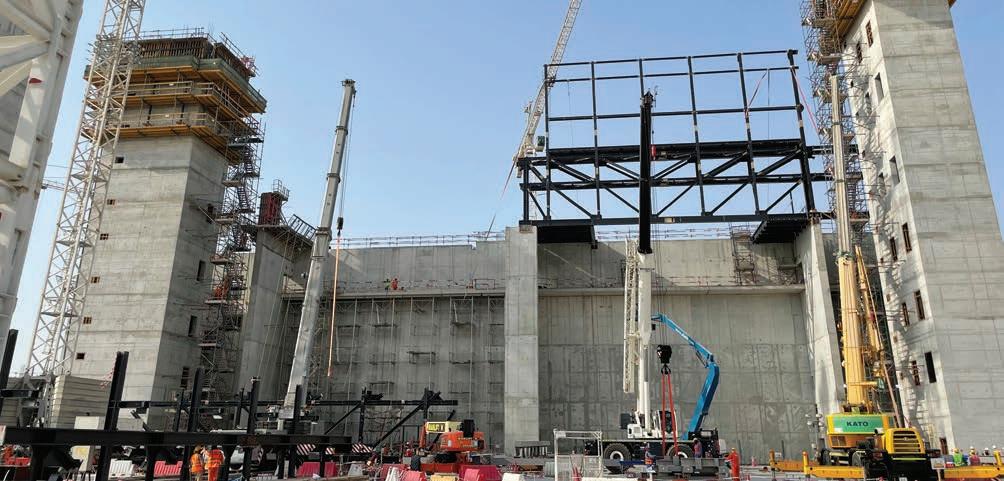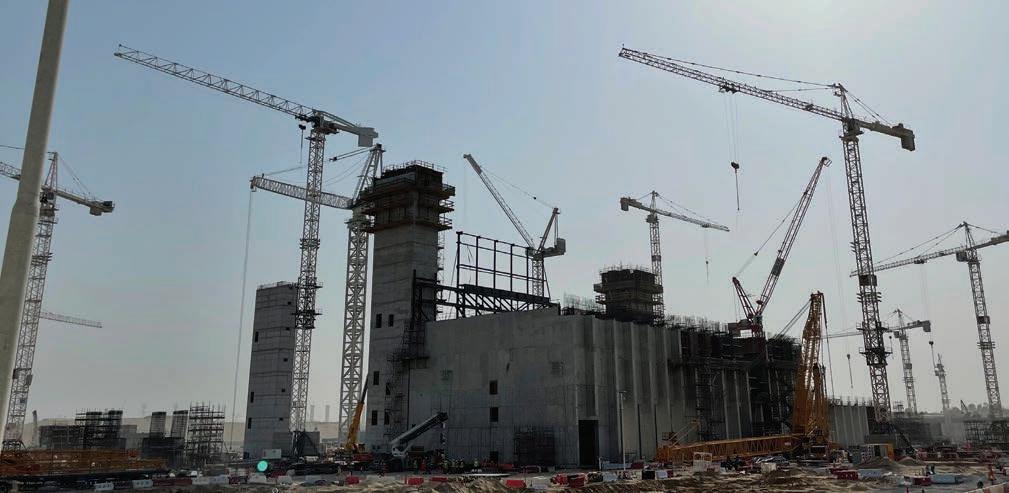
3 minute read
EXPANDING ENERGY FROM WASTE
Expanding the energy from waste market
HITACHI ZOSEN INOVA’S NEW DUBAI ENERGY FROM WASTE FACILITY PROMISES TO BE ONE OF THE LARGEST IN THE WORLD. AS WASTE MANAGEMENT REVIEW LEARNS, ESTABLISHING MEANINGFUL RELATIONSHIPS WITH CONTRACTORS AND GOVERNMENT BODIES CAN SIGNIFICANTLY BOOST THE EFFICIENCY OF FACILITY DEVELOPMENT.
Billed as the world’s largest Energy from Waste (EfW) facility, Hitachi Zosen Inova’s (HZI) Dubai Waste Management Centre will convert an estimated 1.85 million tonnes of municipal waste into sustainable energy annually.
Roni Araiji, Managing Director of HZI’s subsidiary in Abu Dhabi and responsible for the Middle East market, says the centre was born from a need to contain landfilling throughout the region. Waste production throughout the Emirate of Dubai required innovation to contain waste levels.
“The Emirate of Dubai is producing around 9000 tonnes of municipal solid waste a day, or 3.3 million tonnes per year,” Roni says.
“Currently, most of this waste would end up in landfill. With the realisation of the EfW plant, around 55 per cent of waste will be diverted from landfills leaving a resource recovery potential of 45 per cent and growing, as the waste arising is likely to grow with further affluence and more residents.”
The Dubai Waste Management Company, consisting of HZI (a 100 per cent subsidiary of Hitachi Zosen Corporation, Japan), Ecosix (part of the Belgium BEXIS Group), Dubai Holding and ITOCHU Corporation, will develop the EfW facility.
Touted as a landmark project for Dubai, it will be located in the eastern end of the Warsan 2 region and will transform waste into electricity for the urban power grid.
SUPPORTING THE SUSTAINABILITY STRATEGY
In 2006, throughout the early development of the EfW project, HZI took a concerted effort to ensure
The Dubai facility will have the capability to process 3.3 million tonnes of waste per year.
More than 135,000 homes will be powered by the Dubai facility when fully operational.
the facility would align with the sustainability vision of the Emirate of Dubai and the United Arab Emirates (UAE).
When fully operational, the EfW will be capable of providing power to 135,000 homes and divert materials away from landfill in the area. It’s not just the size of the plant that’s impressive: the net energy efficiency of more than 31 per cent also puts it at the very top of the international rankings.
The realisation of this project is a key component of Dubai’s sustainability strategy. The facility’s residual ash production will also be a source of reusable metals and construction material.
Roni says the facility will greatly contribute to Dubai’s vision of a cleaner and more efficient waste treatment solution.
Its flue gas treatment has been designed to meet the locally applicable European Waste Incineration Directive. Hence, it will operate at the same strict limits as most plants in Europe, the United Kingdom, as well as Australia.
FUTURE OPERATION
By utilising its international knowledge of EfW facilities, HZI will take the lead to operate and maintain the facility for the next 35 years.
It will include five combustion lines with state-of-the-art moving grate and boiler system, which, Roni says, will enable an unprecedented waste treatment production level.
With an annual treatment level of 1.85 million tonnes, the facility will be able to meet increasing waste production well into the future.
“If we compare with Europe, these facilities normally have the capacity to treat average 300,000 tonnes of municipal waste annually,” Roni says.
“The largest project in the United Kingdom can treat 700,000 tonnes per year. The largest project in Europe is in Istanbul, which has the capacity to treat one million tonnes annually.”
HZI has developed a long-term strategy for the facility, which consists of a Build, Own, Operate and Transfer, so-called BOOT, contract. HZI and its partners will build and operate the facility for 35 years as part of a concession plan with Dubai Municipality.
HZI’s neutralised potential barriers, such as the impact of COVID-19 with its pro-active approach.
“In the development phase, we had some difficulty due to the pandemic as we could not travel to certain regions or plan face-toface, but in the execution phase, we have been unaffected. In addition, the vast majority of the personnel on-site have been fully vaccinated as well,” Roni says.
Major works on the facility are under way, including installing components such as the boilers. Roni expects the commercial operation date to be July 2024.
Dr Marc Stammbach, the Managing Director of HZI Australia, added: “Dubai is not only an EfW technology marvel but also a showcase of how a concerted governmental approach can achieve a rapid and significant landfill diversion for a metropolitan area”.

For more information, visit: www.hz-inova.com/projects/dubai-uae/










